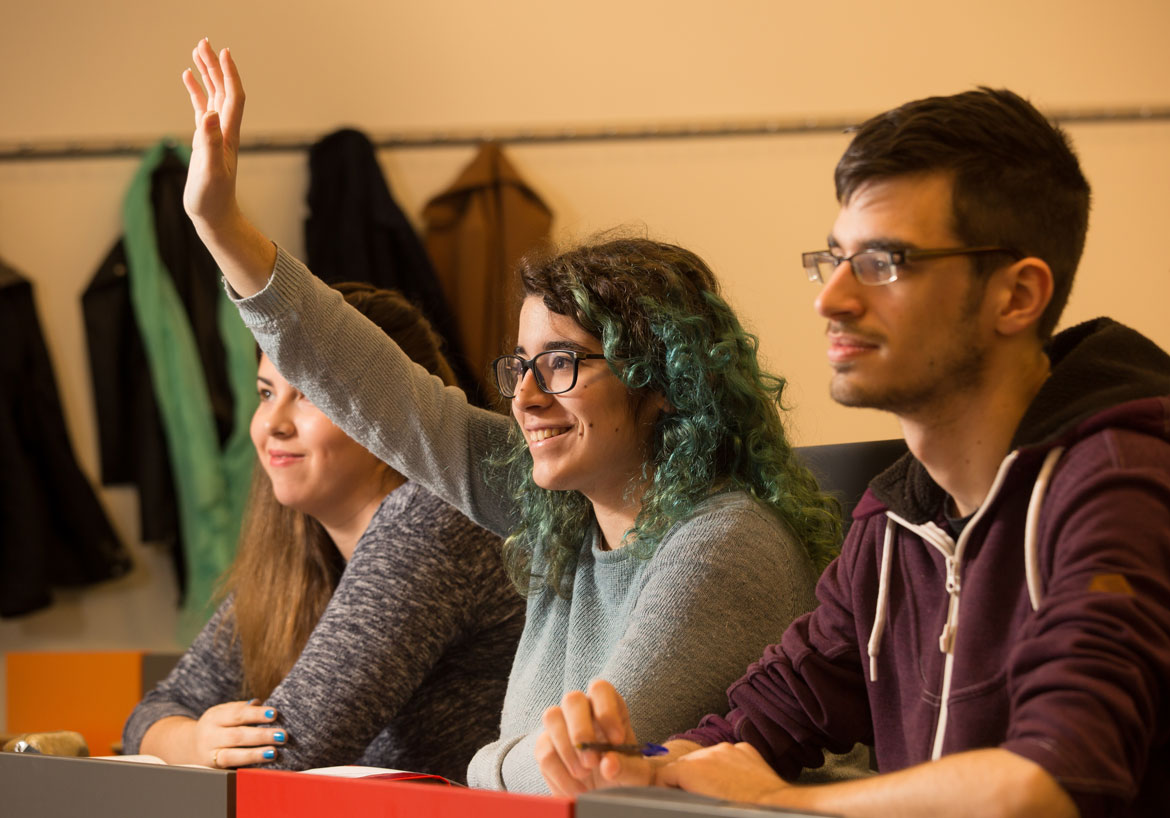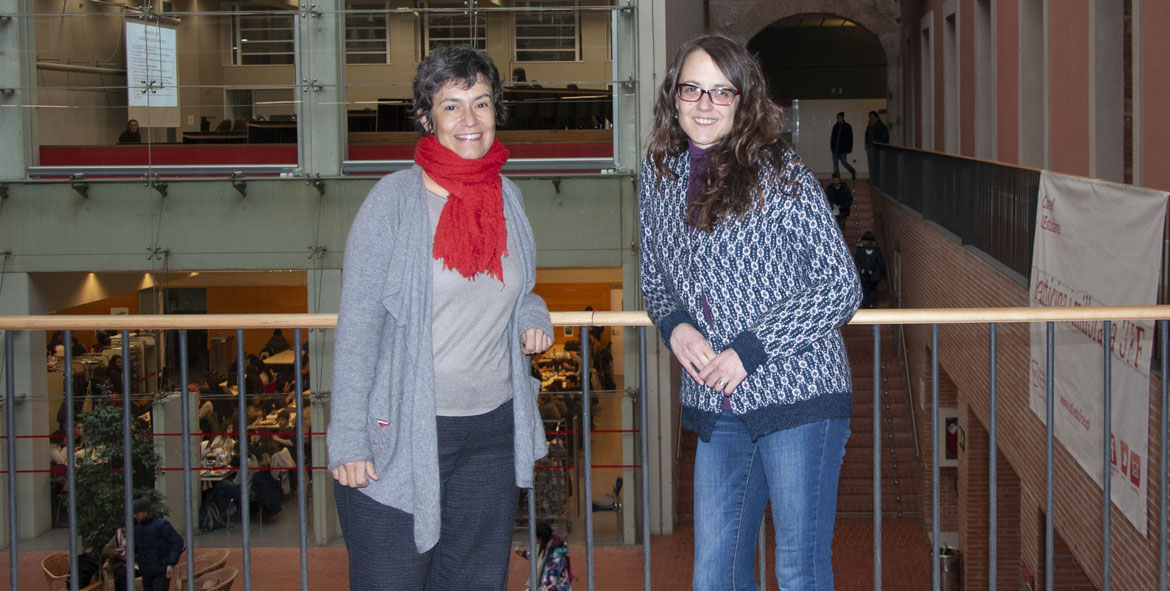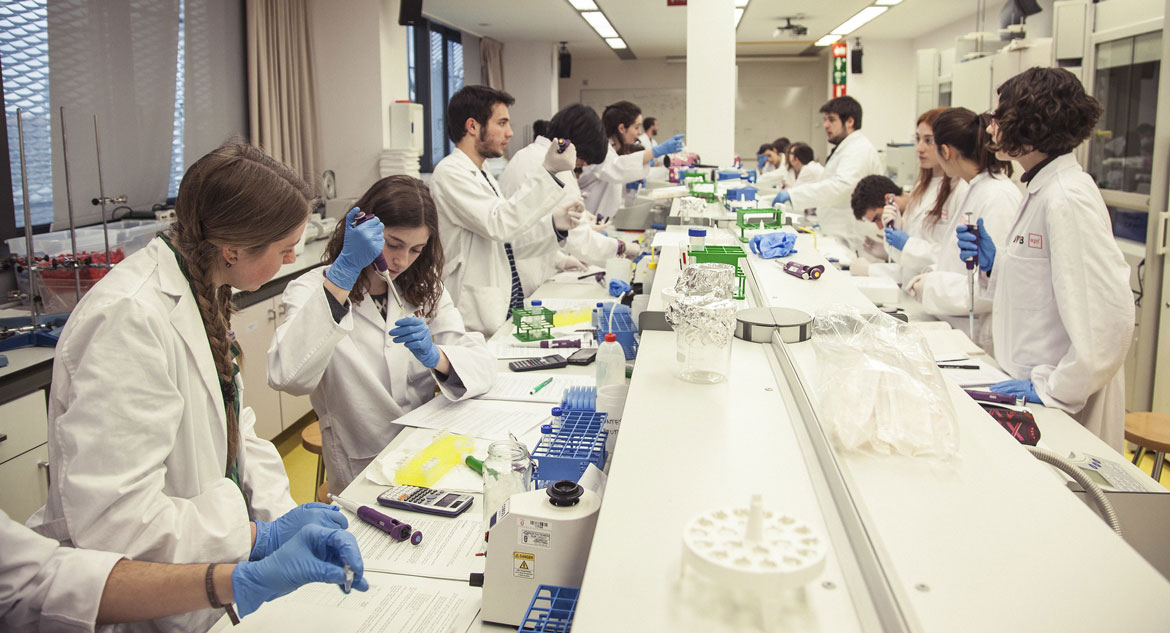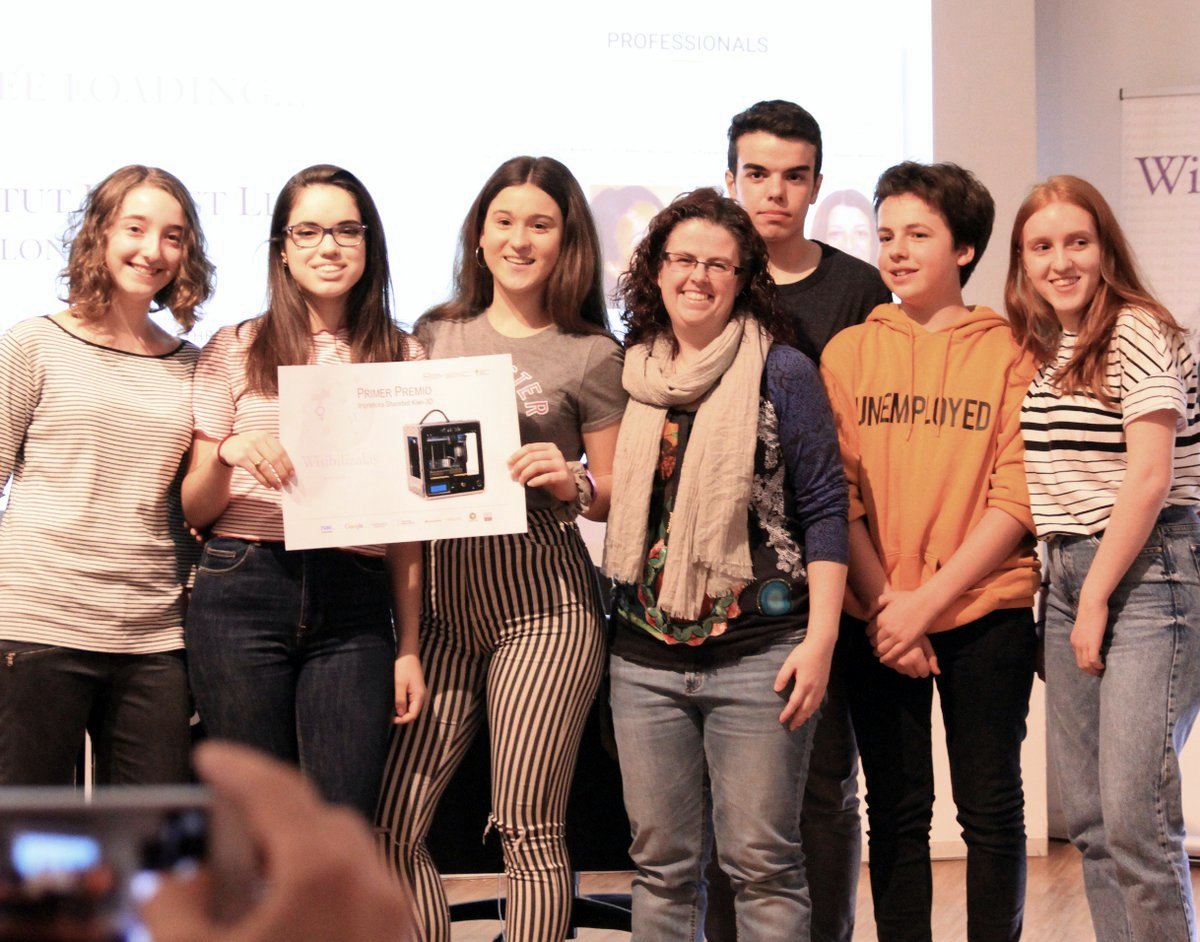comunitat
2. Community
The university of the 21st-century will be equal or it will not be at all
The gender perspective has come to stay at universities. It improves the quality of teaching and research, makes institutions more democratic and commits them to societal transformation.

La Universidad Española en Cifras. 2016-2017 (Spanish Universities in Figures: 2016-2017), the most recent report published by the Conference of Rectors of Spanish Universities (CRUE), points to a sustained increase in recent years in the number of women lecturers at Spanish universities. However, progress is very slow and has yet to do away with the existing imbalance in some teaching categories.
Similarly, the report La perspectiva de gènere en docència i recerca a les universitats de la Xarxa Vives d’Universitats (The Gender Perspective in Teaching and Research at Vives University Network Universities), published in March 2017 and coordinated by Tània Verge, director of the Equality Unit at UPF, and Teresa Cabruja, a lecturer at the University of Girona (UdG), shows that much remains to be done in this area and calls for a greater commitment to enforcing equality laws.
‘Universities operate with the same inertia that drives society at large; therefore, if a society harbours unequal practices, gender stereotypes and implicit biases, universities will not be exempt’, explained Mònica Figueras, vice-rector for social commitment and equality projects at UPF.
Nevertheless, the vice-rector continued, ‘the Interuniversity Council of Catalonia, especially the Women and Science Committee, has done a lot of work in recent years to improve the Catalan university system’. In this regard, an interuniversity agreement has been signed to transfer the transcripts of women victims of gender-based violence and those of their children free of charge. Work has been done with the Catalan University Quality Assurance Agency (AQU Catalunya) to include the gender dimension in the quality assessment processes for degree programmes. And standardized gender indicators have been defined to assess the composition of the university community’s three component groups and the various academic programmes. ‘UPF has led many of these projects and interuniversity partnerships’, Figueras explained. ‘An equal university will also be better quality, more democratic and more radically committed to social transformation.’
“The Interuniversity Council of Catalonia has done a lot of work in recent years to improve the Catalan university system, and UPF has led many of these projects and interuniversity partnerships”
The gender perspective is an action principle for all public authorities. According to Verge, ‘It helps improve the quality and social relevance [of teaching and research] by cultivating the ability to assess inequalities on grounds of sex, gender and sexual diversity and to design solutions.’
Students are increasingly demanding that their education take the gender perspective into account. Miquel Salbanyà, a student on the bachelor’s degree programme in Law interning in the Equality Unit, calls for its ‘cross-disciplinary incorporation into the syllabi, with subjects that address the subject from the first year, to keep students from accumulating the baggage of gender roles and other consequences of socialization whilst at university’. According to Salbanyà, ‘The new generations coming up are more aware of these issues, thanks to the work done by the feminist movement and the sexual liberation and gender movements.’ ‘The University needs to offer more specific training on the subject to equip students with tools and alternatives to change the world we live in’, he added.
Where do things stand at UPF in particular? To begin, a quick snapshot of the university community might be helpful.
Teaching and research staff
Administrative and service staff
Students
| Bachelor's Degree | Master | Doctoral programmes | |
|---|---|---|---|
| Total Women | 6296 | 516 | 672 |
| Total Men | 4113 | 387 | 609 |
Some conclusions that can be drawn at a glance
Teaching and research staff
-
There is a considerable difference (nearly 20 per cent) in the number of male and female teaching and research staff.
-
In the case of the most senior teaching positions, the gap is even wider, reaching almost 70 per cent amongst full professors.
Administrative and service staff
-
Women are a majority at virtually all levels of management. There is an overall difference in their favour of more than 30 per cent.
-
Nevertheless, there is no bias with regard to the most senior positions. The percentage translates almost perfectly.
Students
-
Overall, there are more women students than men, especially in undergraduate programmes, where this difference stands at 20 per cent.
-
Although women continue to account for the majority of master’s and doctoral students, men are gradually closing the gap, which stands at just 5 per cent in doctoral programmes.
-
With regard to undergraduate studies, women are a majority in all areas except Political and Social Sciences (44 vs 56 per cent) and Engineering and Information and Communication Technologies (30 vs 70 per cent). The largest differences in favour of women are found in the fields of Communication, Translation and Language Sciences, and Health and Life Sciences.
-
At the master’s level, men outnumber women in Engineering and Information and Communication Technologies and in Economics and Business. In contrast, the three areas with most women remain the same – Communication, Translation and Language Sciences, and Health and Life Sciences – although the gap is considerably narrower.
-
Finally, at the doctoral level, the trend is reversed, with men outnumbering women in 5 of the 8 fields: Engineering and Information and Communication Technologies, Economics and Business, Political and Social Sciences, Humanities, and Law. The three areas most heavily dominated by women at both the undergraduate and master’s levels are the only ones in which they continue to outnumber men at the doctoral level as well.
The key role of the UPF Equality Unit
To combat the gender inequalities on display in the snapshot of the UPF community, which are also reflected in various aspects of university life, in 2017, UPF created the Equality Unit, ‘a specialized university service that advises the governing bodies, implements programmes to promote gender-equality policies at UPF and its affiliated centres, and coordinates the specific actions undertaken by the various bodies, services and academic and administrative units in this area’, Verge explained.
According to Figueras, ‘The institutionalization of the equality structure at UPF, which was given its own budget and staff and operates an office on the Ciutadella campus, was a quantitative leap in the implementation of the gender perspective at the university.’

The unit’s existence has ensured that the gender perspective ‘is more effectively implemented across all the university’s policies. Additionally, it enables participation in interuniversity fora dedicated to this area and facilitates the sharing of good practices and the promotion of measures within the Catalan university system’, she said.
“The institutionalization of the equality structure at UPF, which was given its own budget and staff and operates an office on the Ciutadella campus, was a quantitative leap in the implementation of the gener perspective at the university”
The tool that the university uses to implement the strategy to be followed to further gender equality is the Equality Plan. ‘The First Plan, adopted in 2008 by the Board of Governors, put gender equality policies on the university’s agenda for the first time’, Verge explained. ‘The Second Plan, adopted in 2018, expanded the number of strategic action areas. It places special emphasis on the incorporation of the gender perspective into teaching and research, the fight against gender-based violence and LGBTI-phobia, and the LGBTI perspective, which takes diversity in sexual orientation, gender identity and gender expression into account.’
The five strategic areas of the Second Equality Plan (2018-2022) are as follows:
-
Promotion of a culture of equality
-
Gender-sensitive teaching, research and knowledge transfer
-
Equal access to jobs and promotions
-
Equal participation and representation
-
UPF, an institution free of discrimination and violence
Parallel to the creation of the Equality Unit, the Standing Committee for Gender Equality Policies was resurrected, to ensure accountability for the activities carried out and to gather proposals from all groups and coordinate policies with the university’s affiliated centres. Currently, the university is promoting the creation of equality committees at these centres.
The gender perspective in teaching and research
This is one of the strategic areas of the Second Isabel de Villena Equality Plan due to its vital social importance: unequal recognition of women’s academic and scientific contributions; failure to take into consideration how social, political, economic and cultural phenomena, as well as technology and medicine, impact women and men differently; gender biases in the learning environment; etc.

UPF has taken various steps to effectively implement the gender perspective in teaching. ‘It has been incorporated as a cross-disciplinary competence in the new EDvolution education model that the university is developing’, Verge explained. Additionally, ‘the academic offer specialized in gender has substantially increased in recent years, including through the creation of a minor in Gender Studies’, she added.
Furthermore, to encourage students to explore these subjects, the university created a prize for a bachelor’s degree final project in Gender Studies. The prize is currently in its fifth edition and has the support of the Catalan Women’s Institute (ICD). In view of its success, this year the university will also be awarding prizes for master’s degree final projects and doctoral theses in Gender Studies.
The Equality Unit also offers a wide range of materials and resources to make it easier for teaching and research staff to identify how to apply the gender perspective in their subjects. One outstanding example is the three-part miniseries Docència #AmbPerspectiva (Teaching #WithPerspective), which aims to explain the foundations for teaching without gender biases.
Miniseries Teaching #AmbPerspectiva
Each year, the university’s Center for Learning Innovation and Knowledge (CLIK) also offers several courses for teaching and research staff to further their knowledge of this subject. Finally, UPF has created the #AmbPerspectiva (#WithPerspective) network, comprising more than 30 teaching and research staff members from all the university’s knowledge areas, to provide support for all teachers seeking to incorporate the gender perspective into their subjects.
This effort, which is being carried out by the Equality Unit, is supported by the work of other institutions. AQU Catalunya recently published the document General framework for incorporating the gender perspective into university teaching. Likewise, the Vives University Network recently published a collection of Guides for university teaching with a gender perspective that cover various disciplines and knowledge areas.
UPF has created the #AmbPerspectiva network, comprising more than 30 teaching and research staff members from all the university's knowledge areas, to provide support for all teachers seeking to incorporate the gender perspective into their subjects.

An enormous amount of work must also be done in the area of research. ‘Until just a few years ago, it was very poorly regarded for women to join technical programmes and certain scientific disciplines’, said Gema Revuelta, a lecturer in the Department of Health and Life Sciences and member of UPF’s Centre for Gender Studies (CEDG). ‘Historically, society has not encouraged women to stand out and pursue their own development in any career.’ That is a vicious cycle, because it means that ‘there are no role models for girls, who are often brought up being told what is and is not ladylike.’
The gap observed in enrolment on scientific and technical programmes is also found amongst professional researchers, along with significant differences in positions of responsibility, as can be seen in the snapshot of UPF’s permanent teaching and research staff. Even ‘in areas such as the health and life sciences or social sciences, where women outnumber men, women do not hold the positions of responsibility’, Revuelta explained. This is not something that can be addressed simply by promoting objective recruitment criteria, such as the number of publications, ‘because even when such criteria are applied [...] women are penalized if they have taken time off for a maternity leave’, she said.
“Society has not encouraged women to stand out and pursue their own devolpment in any career and there are no role models for girls, who are often brought up being told what is and is not ladylike”
To mitigate this situation, as part of its María de Maeztu project, the Department of Health and Life Sciences has created its own gender policy committee, which works in coordination with the Equality Unit. With the aim of improving the research careers of the department’s women scientists, ‘a minimum of 40% of all committee and decision-making-body members must be women’, said Revuelta. ‘Financial aid for maternity has also been implemented to facilitate work-life balance and specific training programmes have been organized for women to boost their self-confidence and the acquisition of skills related to furthering their careers’, she added.
UPF, an institution free of discrimination and violence
With the aim of making the university a more egalitarian and respectful environment, where everyone can live and pursue their education and careers with complete freedom, between 2017 and 2018, the university established a name-change procedure for transsexual, transgender and intersex people and a protocol for preventing and resolving conflicts involving gender-based violence, homophobia, biphobia and transphobia.
According to Lluïsa Rojas, the UPF equality offer responsible for managing the protocol, it is a tool ‘to ensure co-existence and the well-being of all members of the university community. Even though many people think that situations of gender-based and LGBTI-phobic violence do not happen at universities, they do.’
For Figueras, the fight against gender-based violence is a priority line of action. ‘We were one of the first universities to develop a protocol that included the three component groups [of the university community], as well as situations of LGBTI-phobia.’ The protocol ‘covers violent behaviours occurring anywhere on campus or at university facilities, or anywhere else when the behaviour takes place in the context of an activity or service organized by UPF or when it is linked to a relationship arising from work-related or educational activity’, Verge added.
The Equality Unit has various means of offering support, whether or not the protocol is activated and regardless of whether the situation takes place at or outside the university. According to Rojas, ‘We facilitate curricular changes and provide a free, completely confidential therapy service and psychological counselling. We also have an Equality Fund, which is used to provide financial aid to pay for tuition for people whose academic progress has been disrupted by a situation of gender-based or LGBTI-phobic violence experienced at or outside the university.’
‘However, the protocol has a very clearly delimited scope of action’, Rojas continued, ‘namely, to fully respect the will of anyone who suffers this kind of violence. We never take any action without the person’s knowledge and consent.’
We spoke with CPS, a student on the double bachelor’s degree programme in Criminology and Public Prevention Policies and Law. C took advantage of UPF’s name change protocol for transsexual, transgender and intersex persons.
What do you think of the fact that UPF has this kind of Procedure?
The fact that this procedure exists is very positive and has an even more profound and positive impact on the life of trans and/or intersex people (the terms are not mutually exclusive) who request such name changes.
The procedure for legally changing your name is cumbersome and slow, and it largely depends on whether you can prove that you are publicly and continuously using the name that you identify with, the one you want to end up being your legal one. If this protocol did not exist, until the name change was legally granted, we would have to hear ourselves being called by a name that does not represent us every day in the classroom and the university environment, and that does a lot of damage.
What did it mean for you to be able to take advantage of this procedure?
Personally, having a student ID with the name C was very useful to me, because I submitted it as proof at the Registry Office. It also gave me peace of mind whilst I was carrying out my name change at the university, because I knew that it was no longer my word against someone else’s: that name represented me at the university thoroughly and indisputably. That spares you a lot of awkward conversations and has a positive impact on your self-esteem and mental health. Taking advantage of the protocol made me feel like I had institutional support and that my autonomy with regard to my own identity was being recognized.
Do you think that society at large is aware of the benefit that it entails?
I think people still don’t understand how important it is for trans and/or intersex people to have their identity respected, in every way. You only need to glance at the research on the trans community and mental health to see how important it is to use a person’s preferred name and pronouns and facilitate access for them to hormonal and surgical treatments, should they so wish. It dramatically reduces the suicide rate and significantly improves the mental health of the person in question.
It is hard to ‘come out’ because of the prevalence of transphobia in society. For people to recognize your identity is crucial.
How have the people in your university environment handled your name change?
In general, the experience has been positive. There has been some reluctance, and I’ve had to correct some people a few times when they called me by my dead name, but, in general, my classmates have been receptive and I am very grateful to them for it. The fact that my name was recognized within the university, and that I was listed as C and not in any other way on the class lists, played a very important role.
How would you rate UPF’s work in the area of gender?
I can’t really evaluate UPF as a whole, as it is a very big and diverse institution. That said, I know first-hand that UPF Equality is doing a lot of work in this regard. They are trying to get the university community in general to get its act together and adopt a gender perspective. Much still remains to be done, but it will only be effective if everyone assumes their responsibility for this task and stops outsourcing it to others. At the end of the day, the system is the people. If we want to change it, we have to update our habits, our ways of thinking and how we participate in spaces for activism.
Community awareness, essential
The awareness of all component groups of the university community is essential, first, to make the problem more visible and, second, to ensure their commitment to the shared search for solutions. ‘We have gone from sporadic activities, unrelated to social movements or collaboration with student associations, to stable, integrated programming jointly coordinated by the university’s various services’, Figueras explained.
The high point of this programming ‘is the organization of the activities included in the three “equality weeks” held around three significant dates: 8 March, International Women’s Day; 17 May, International Day against Homophobia, Transphobia and Biphobia; and 25 November, International Day for the Elimination of Violence against Women’, said Rojas.
However, awareness-raising is not only pursued within the institution. The university is also home to initiatives that go beyond the campus walls and, specifically, seek to change the perceptions of society at large. One good example can be found in the area of Information and Communication Technologies Engineering (ETIC). For years, the area has run a specific programme for girls as part of its María de Maeztu project intended to encourage them to pursue scientific and technological careers.
Amongst other activities, it holds the Wisibilízalas (Wisibilize Them) contest, a competition aimed at primary and secondary schools intended to break down the barriers that still associate science and technology with men. Participating teams have to create websites showcasing women who work in the field of information and communication technologies. In the same line, they organize activities on technological topics specifically targeted at girls and young women. That is the case, for example, with the course Girls in Data Science: Introduction to Data Science, offered as part of the UPF Junior Campus summer programme.

Another external awareness-raising initiative is Viquidones UPF (UPF WikiWomen), launched in 2016 by the Equality Unit, ETIC, Amical Wikimedia (a non-profit association made up people who collaborate on Wikimedia Foundation projects), WikiWomen (the official group of women Wikipedia users), and Dones en Xarxa. With weekly meetings at the university, its mission is to identify gender bias on Wikipedia and narrow the gap by posting content and biographies about women.
“We have a firm political commitment, a clear roadmap and outstanding leadership and expertise on the part of the Equality Unit director and the equality officer. Now we need to train and provide support for the university's various areas to make institution-wide structural progress on the organization”
‘We have a firm political commitment, a clear roadmap and outstanding leadership and expertise on the part of the Equality Unit director and the equality officer’, Figueras said. ‘Now we need to train and provide support for the university’s various areas to make institution-wide structural progress on the organization’, she added. ‘It is not merely a matter of compliance with current legislation. The university feels co-responsible for advancing towards a fairer society, in which sex and gender do not condition access to opportunities, resources and recognition.’
For the time being, the university is fulfilling this political commitment cited by the vice-rector quite satisfactorily. Indeed, UPF ranks 8th worldwide in tackling gender equality, according to the recent innovative ranking published by Times Higher Education in relation to the UN SDGs.
